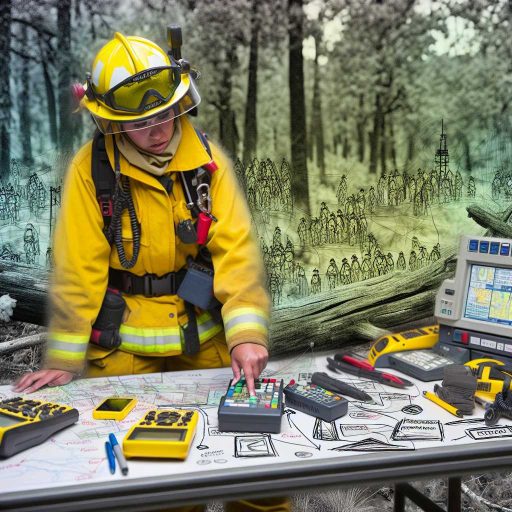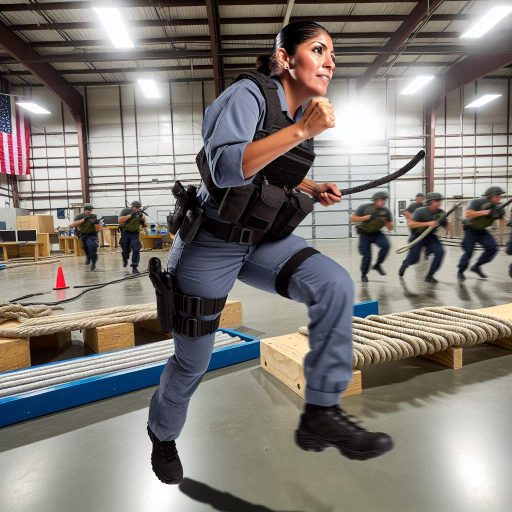Role of Parole Officers
A parole officer is an agent who supervises and supports individuals released from prison.
They play a crucial role in the criminal justice system.
Ensuring offenders successfully transition back into society is their main objective.
Work Environment
Parole officers work in various settings such as offices, correctional facilities, and communities.
They often travel to meet with clients for home visits.
Additionally, they attend court hearings.
Daily Responsibilities
These professionals manage caseloads and conduct risk assessments.
They enforce conditions of parole and offer guidance and resources.
Collaboration with other agencies and stakeholders is vital.
Challenges Faced
Parole officers must navigate challenging situations regularly.
They deal with high-risk offenders and manage large caseloads.
Limited resources can complicate their work as well.
Positive Aspects
Despite challenges, many parole officers find fulfillment in their roles.
Helping individuals turn their lives around can be very rewarding.
Building trust and rapport with clients is impactful.
Career Growth
With experience and additional training, officers can advance.
They may obtain supervisory positions or specialize in specific fields.
Continuous professional development is crucial for advancement.
Importance of the Role
The work environment of parole officers is dynamic and demanding.
A combination of compassion, professionalism, and expertise is required.
Transform Your Career Today
Unlock a personalized career strategy that drives real results. Get tailored advice and a roadmap designed just for you.
Start NowTheir role is vital in promoting public safety.
Additionally, they help individuals reintegrate into society successfully.
Responsibilities of a Parole Officer
Parole officers have a crucial role in the criminal justice system.
They are responsible for various tasks:
Supervising Parolees
- Monitor the activities and behavior of parolees to ensure they are following the rules.
- Provide guidance and support to help parolees successfully reintegrate into society.
- Offer resources and referrals to help parolees address any issues they may face.
Ensuring Compliance with Parole Conditions
- Review and enforce the conditions set by the parole board for each parolee.
- Document any violations of parole conditions and take appropriate action.
- Work with parolees to create a plan for meeting their obligations and goals.
Conducting Home Visits and Drug Tests
- Visit the homes of parolees to assess their living conditions and provide support.
- Administer drug tests to ensure parolees are abstaining from illegal substances.
- Use home visits and drug tests as tools to evaluate the progress of parolees.
Parole officers play a critical role in helping individuals who have been released from prison successfully reintegrate into society.
Their duties involve supervision, enforcement, and support, with the ultimate goal of promoting public safety and reducing recidivism.
Work Environment of Parole Officers
The work environment of parole officers is dynamic and demanding.
It requires a mix of office-based work and fieldwork.
Office-based Work
Parole officers spend time in their offices preparing reports.
They also meet with colleagues and review case files.
Officers use this time to analyze and assess the progress of their parolees.
They plan for their future needs as well.
Collaboration with other professionals is essential.
This includes psychologists and social workers for effective support.
The office environment serves as a hub for communication and coordination.
Administrative tasks also occur in this setting.
Fieldwork and Community Visits
Parole officers conduct regular visits to the homes of their parolees.
They check on their progress and compliance during these visits.
Interviews, drug tests, and home inspections are part of their duties.
Showcase Your Business Today
Reach thousands of readers actively exploring professional services. Publish your business profile and grow your audience now.
Publish NowDuring visits, they observe the living conditions of parolees.
Understanding support systems in place is crucial.
Community visits provide valuable insights into daily lives of parolees.
Officers build relationships with community members as well.
This includes employers and service providers to enhance support networks.
Working Irregular Hours and Weekends
Parole officers often work irregular hours.
This can include evenings, nights, and weekends.
Such flexibility accommodates the schedules of their parolees.
They must respond to emergencies and conduct surprise visits.
Addressing urgent situations promptly is vital.
Maintaining a constant presence is key for support.
Balancing work and personal life can be challenging.
Conclusion
The work environment of parole officers is dynamic.
It includes office-based tasks, fieldwork, and community visits.
They work irregular hours and weekends for effective support.
This demanding profession requires flexibility and empathy.
Strong organizational skills are crucial for success.
See Related Content: Correctional Officer Interview Tips
Challenges Faced by Parole Officers in Their Work Environment
Being a parole officer comes with its own set of challenges that can be demanding and stressful.
Here are some of the main challenges that parole officers face in their work environment:
Dealing with High-Risk Individuals
Parole officers often have to work with individuals who have a history of criminal behavior and can be considered high-risk.
This means that parole officers need to constantly be on guard and aware of the potential dangers that these individuals pose.
They must be able to assess threats and take appropriate measures to ensure the safety of themselves and others.
Balancing Caseloads and Paperwork
Parole officers are typically assigned a large caseload of clients to supervise, which can be overwhelming at times.
They have to juggle their time between meeting with clients, conducting home visits, attending court hearings, and completing paperwork.
The administrative tasks can be time-consuming and can sometimes take away from the time that could be spent on more direct client interactions.
Managing Stress and Burnout
Working as a parole officer can be emotionally taxing, as officers are often exposed to traumatic and difficult situations on a daily basis.
This constant exposure to stress and high-pressure situations can lead to burnout and mental health issues if not properly managed.
Parole officers need to find healthy coping mechanisms to deal with the stress and prevent burnout.
The work environment of parole officers is complex and challenging, requiring them to navigate through various obstacles in order to successfully carry out their duties.
Despite the challenges they face, parole officers play a crucial role in ensuring public safety and helping individuals reintegrate into society.
See Related Content: Inspiring Stories from Veteran Park Rangers
Safety concerns in the work environment of parole officers
Parole officers often deal with potentially dangerous individuals on a daily basis.
These are individuals who have a history of criminal behavior and may pose a threat to the officer’s safety.
- Dealing with potentially dangerous individuals
- Parole officers must always be prepared for any situation that may arise while interacting with their clients. They must be vigilant and observant to detect any signs of aggression or violent behavior.
- Training is essential for parole officers to effectively handle confrontational situations. They need to be equipped with the necessary skills to de-escalate conflicts and diffuse tense situations before they escalate into violence.
- Handling confrontational situations
- One of the key aspects of a parole officer’s job is to maintain control over their clients while ensuring their own safety. This can be challenging, especially when dealing with individuals who are resistant to authority or prone to violent outbursts.
- Implementing security measures for protection
- Parole officers must take proactive measures to ensure their safety while on the job. This may involve carrying protective gear, such as pepper spray or a taser, and knowing how to use it effectively in case of an emergency.
Safety concerns are a significant aspect of the work environment for parole officers.
It is crucial for them to be well-trained, prepared, and equipped to handle potentially dangerous situations that may arise while carrying out their duties.
Delve into the Subject: How to Write a Professional Bodyguard Resume

Training and Qualifications Required for Parole Officers
Parole officers play a critical role in the criminal justice system by supervising and assisting individuals who are released from prison.
To effectively perform their duties, parole officers must possess the necessary training and qualifications.
Below are the key requirements for becoming a parole officer:
Showcase Your Business Today
Reach thousands of readers actively exploring professional services. Publish your business profile and grow your audience now.
Publish NowEducational Background and Certifications
- Parole officers typically need at least a bachelor’s degree in criminal justice, sociology, psychology, or a related field.
- Some agencies may require additional certifications, such as completing a training program approved by the state.
- Having a master’s degree or relevant professional certifications can provide a competitive edge in this field.
On-the-Job Training and Internship Programs
- After completing the educational requirements, parole officers typically undergo extensive on-the-job training.
- This training may include shadowing experienced officers, learning about parole laws and procedures, and gaining practical experience.
- Internship programs allow aspiring parole officers to apply their knowledge in real-world scenarios under supervision.
Continuing Education and Professional Development Opportunities
- Parole officers are required to stay current on relevant laws, regulations, and best practices in the field.
- Continuing education courses, workshops, and seminars provide opportunities for parole officers to enhance their skills and knowledge.
- Professional associations and conferences offer networking opportunities and access to cutting-edge information in the field.
Becoming a parole officer requires a combination of education, training, and ongoing professional development.
By meeting these requirements, parole officers can effectively fulfill their responsibilities and make a positive impact on the lives of individuals reintegrating into society.
Find Out More: Common Myths About the Cybersecurity Specialist Career
Parole officers play a crucial role in monitoring and supporting individuals reentering society post-incarceration.
Parole officers work in dynamic environments, facing high-risk situations and complex cases that require quick decision-making.
To enable parole officers to fulfill their duties effectively, it is imperative to provide ongoing training, access to resources, and support systems.
The work environment of parole officers is demanding and challenging, requiring continuous support and resources to ensure successful outcomes for both the officers and their clients.
Additional Resources
Probation and Parole Officer II Job Details | State of Vermont
Parole Officer Protection Alarms | Protecting Parole Officers
[E-Books for Sale]
The Big Book of 500 High-Paying Jobs in America: Unlock Your Earning Potential
$19.99 • 500 High-Paying Jobs • 330 pages
Explore 500 high-paying jobs in America and learn how to boost your career, earn more, and achieve success!
See All 500 High-Paying Jobs of this E-Book
1001 Professions Without a Degree: High-Paying American Jobs You Can Start Now
$19.99 • 1001 Professions Without a Degree • 174 pages
Discover 1001 high-paying jobs without a degree! Unlock career tips, skills, and success strategies for just $19.99!




